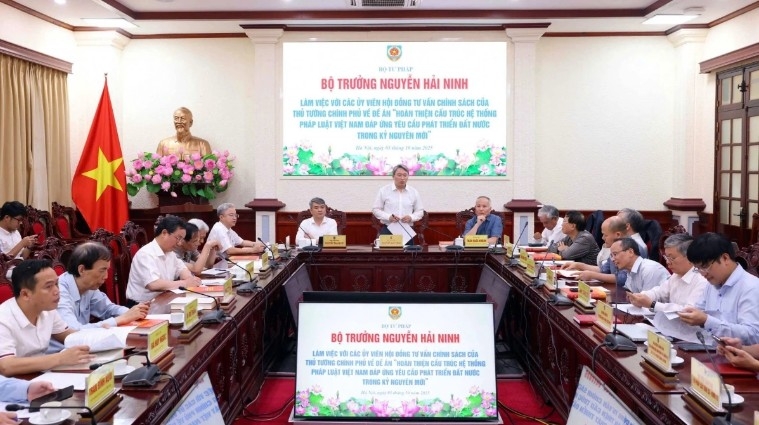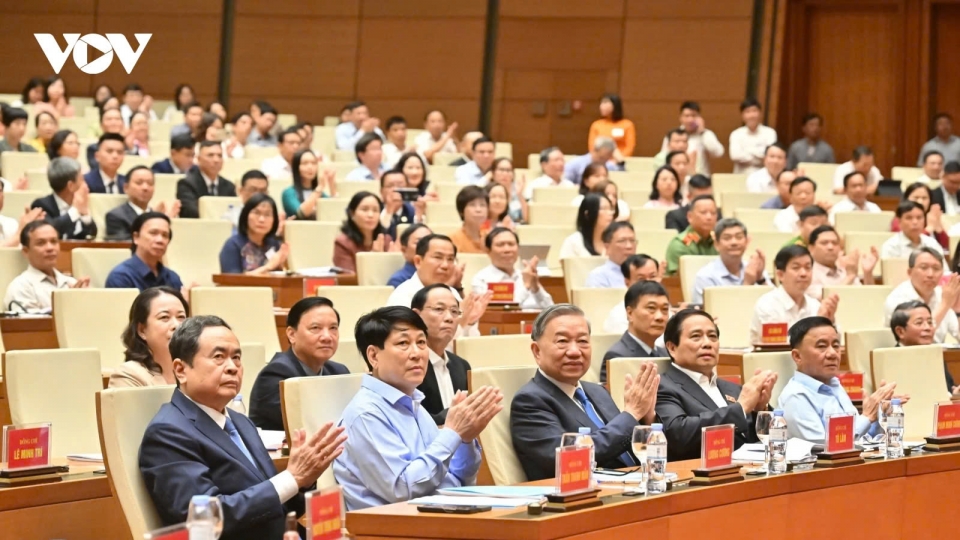Comprehensive framework needed for Vietnam’s legal system in new context
VOV.VN - There needs to be a comprehensive framework for Vietnam’s legal system in the new context, while identifying the essential pillars to meet the country’s development goals for the next 100 years, according to Minister of Justice Nguyen Dang Ninh.

Minister of Justice Nguyen Hai Ninh recently chaired a working session with members of the Prime Minister’s Policy Advisory Council on the project on improving the structure of Vietnam’s legal system to meet the country’s development requirements in the new era.
In his address, Minister Nguyen Hai Ninh said the nation is in a very special period when carrying out a comprehensive reform of the state apparatus, organizing two-tier local administrations, amending the Constitution, and renewing the mindset in lawmaking under Resolution 66 (a 2025 Politburo resolution on renewing the drafting and enforcement of laws).
At the same time, the Politburo has also issued several important resolutions on digital transformation, international integration, and private economic sector development.
“A series of new viewpoints and policies of the Party have been adopted, inheriting previous achievements while also introducing breakthroughs,” the minister stressed, adding that translating these policies into laws and concrete actions at a fast pace requires a comprehensive reform of the lawmaking process. This is both a political necessity and a demand arising from real life.
He emphasized that the existing legal system, built over many years, has contributed significantly to the country’s socio-economic development. However, Resolution 66 pointed out that the system still has many shortcomings and inconsistencies, making revisions and the issuance of new legal documents necessary to address bottlenecks.
Moreover, Resolution 66 requires that the law must not only provide a solid foundation but also lead development and become a competitive advantage. This is a demanding task that involves both resolving long-standing issues and responding to new development needs.
According to Minister Nguyen Hai Ninh, the National Assembly, the Government, and relevant ministries and agencies have been making great efforts. The upcoming National Assembly session will have an extremely heavy workload, with around 50 draft laws and resolutions expected to be tabled, possibly even more.
As an insider, Ninh affirmed that enacting many legal documents within a short period is necessary. However, the Ministry of Justice is also deeply concerned about ensuring the coherence and systematic nature of the legal framework.
Therefore, besides amending specific laws, there needs to be a comprehensive and holistic approach to the legal system. A comprehensive framework for Vietnam’s legal system in the new context is needed to clearly define the essential pillars for the country’s long-term development goals over the next century.
“This is a major task. At the Ministry of Justice’s proposal, we have organized numerous workshops, studied international experience, and found much to learn,” the minister said, expressing hope that while revising and supplementing laws to meet immediate needs, there will also be a long-term vision and a well-structured legal system to ensure coherence, stability, and alignment with the nation’s development objectives.
At the working session, experts contributed many insightful opinions to the draft project, aiming to build a legal and institutional framework that strongly inspires patriotism and the aspiration for national development, unlocks and mobilizes all resources, and turns legal institutions into an international competitive advantage to realize Vietnam’s development goals through 2030 and 2045.
According to them, the legal system must be reasonably designed in both content and structure, ensuring a dialectical relationship among its components, especially between different legal sectors, between substantive and procedural laws, among branches, institutions, and legal norms, and among different sources of law. It should maintain sufficient stability to enhance predictability for citizens and businesses while remaining open and flexible enough to anticipate future developments, enabling compliance and effective implementation.
They noted that this can only be achieved through a carefully considered framework of a more coherent legal system that fully and promptly institutionalizes the Party’s orientations on national development in the new era.
The design principles must be clearly defined, ensuring simplicity, unity, consistency, feasibility, transparency, and accessibility, while promptly serving socio-economic development tasks, ensuring national defence and security, facilitating international integration, and enabling the smooth operation of the state apparatus and political system under the two-tier local administration model, thereby fulfilling the nation’s two centenary goals.



